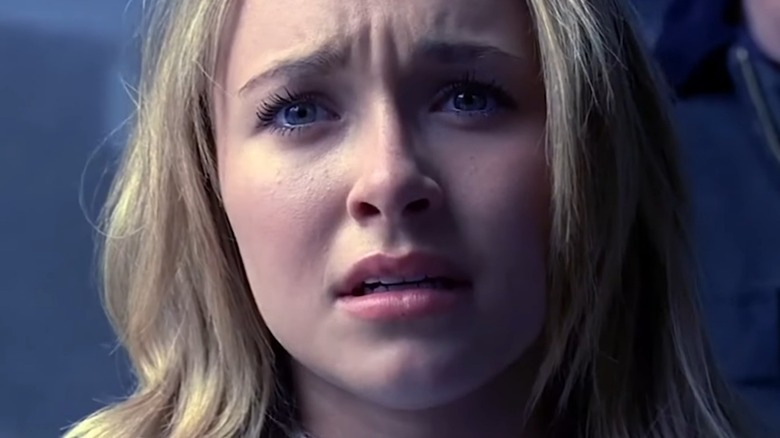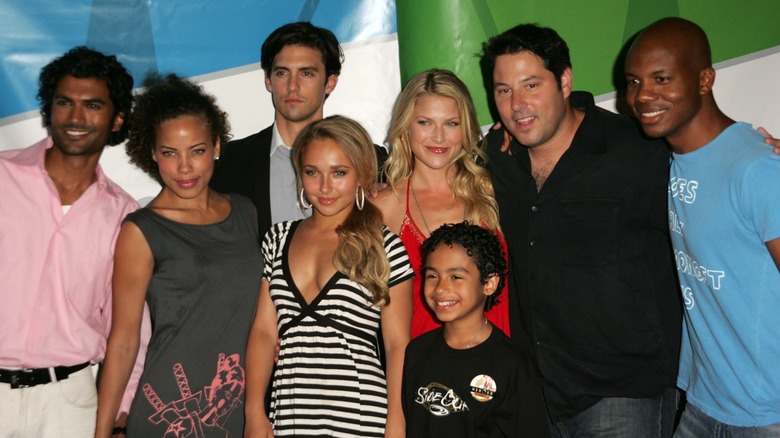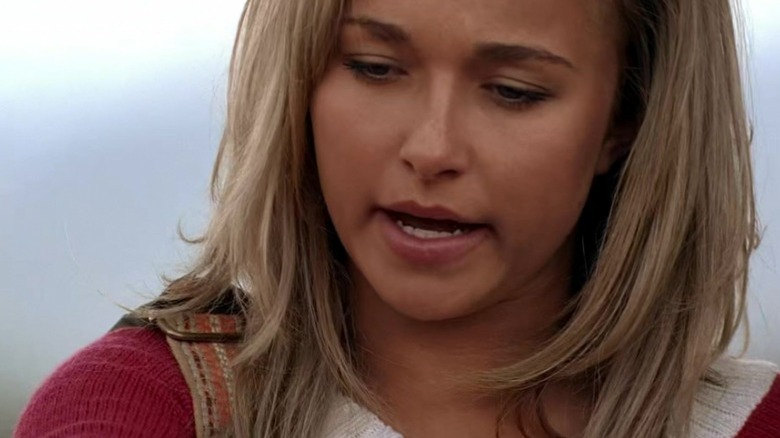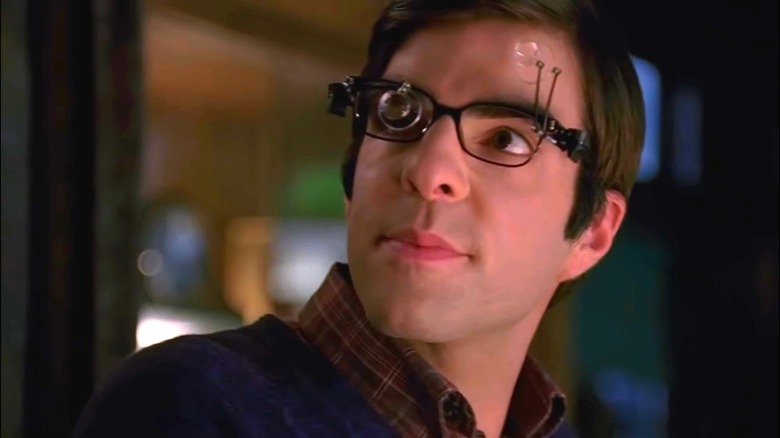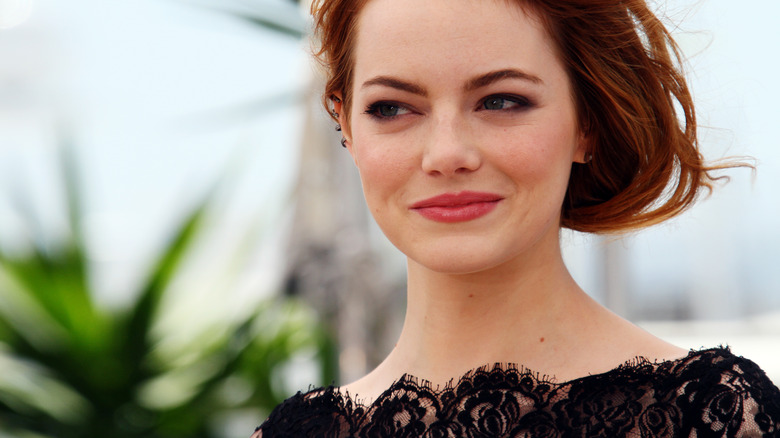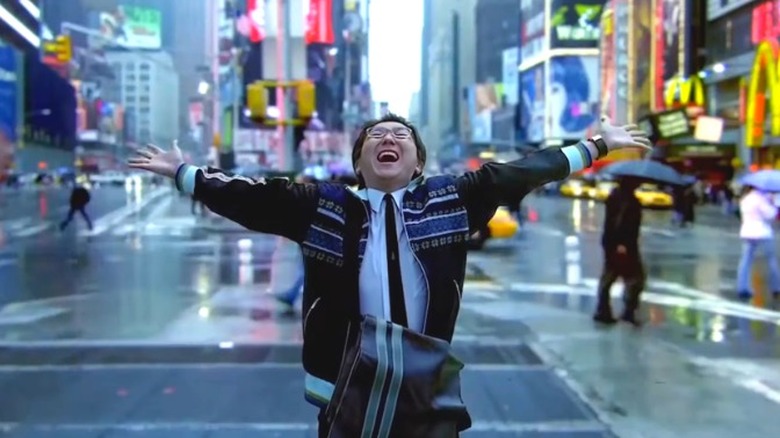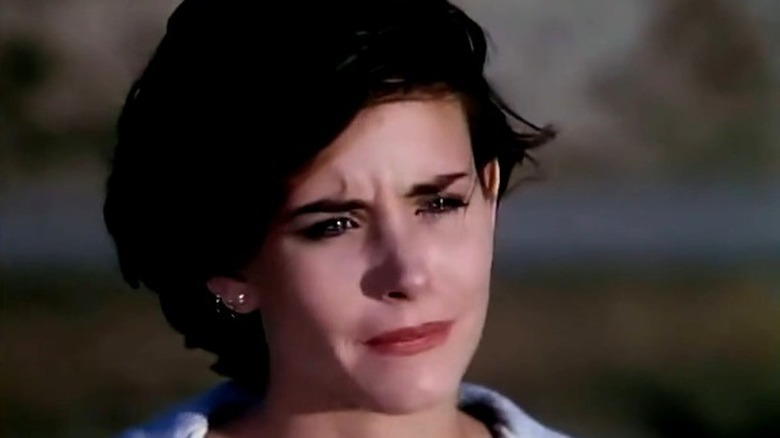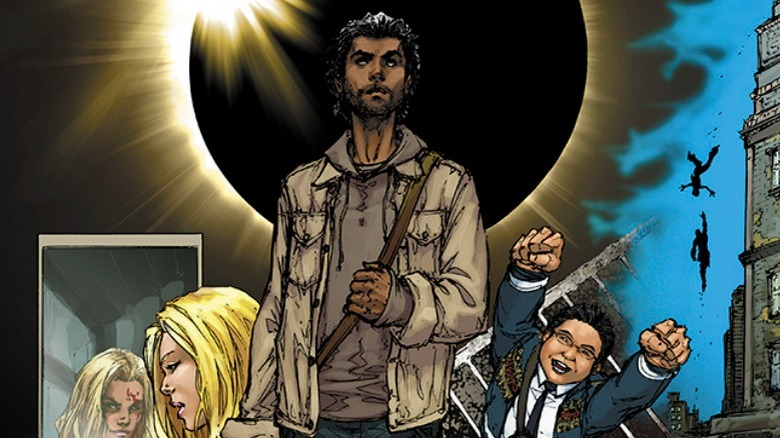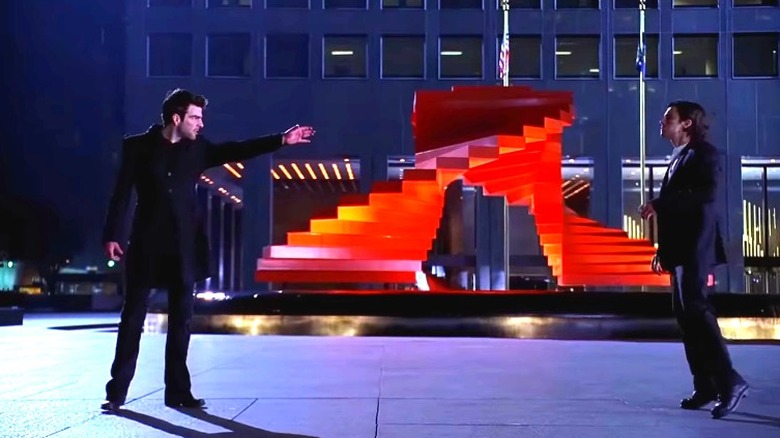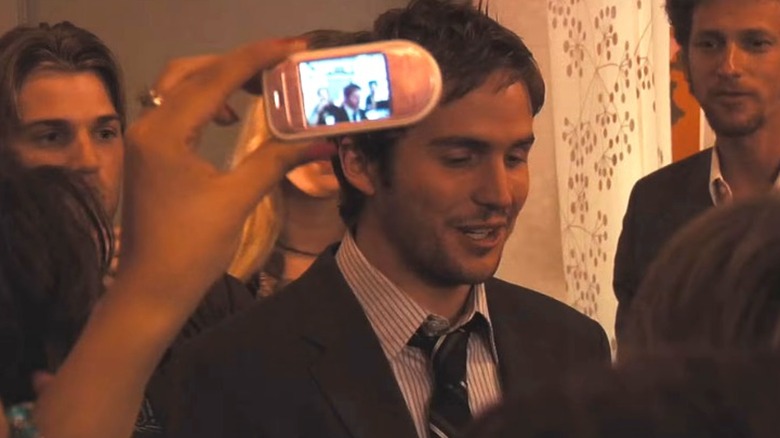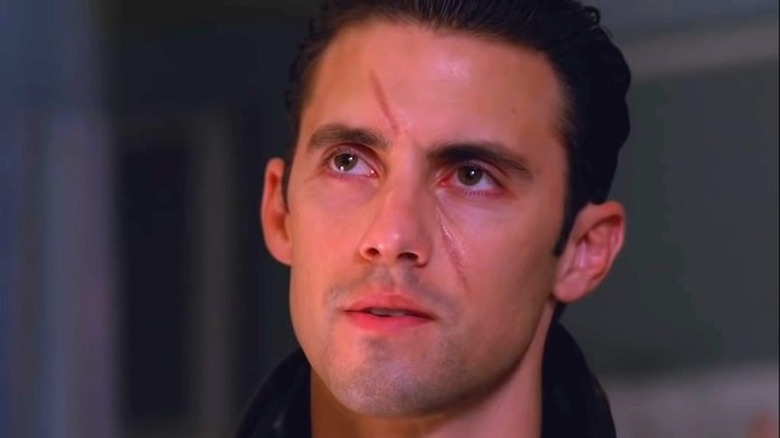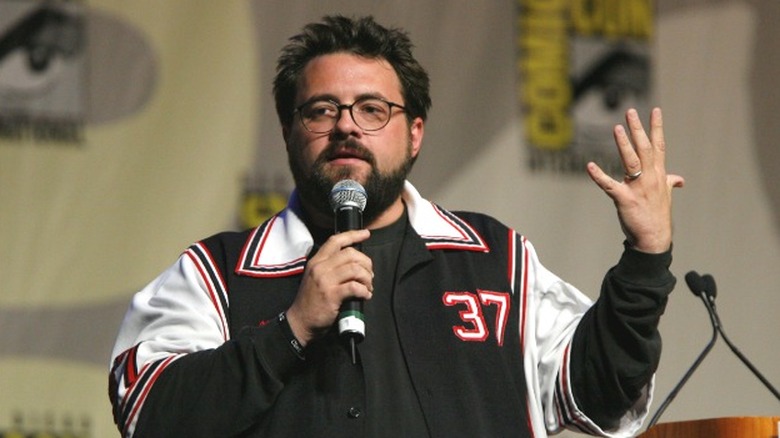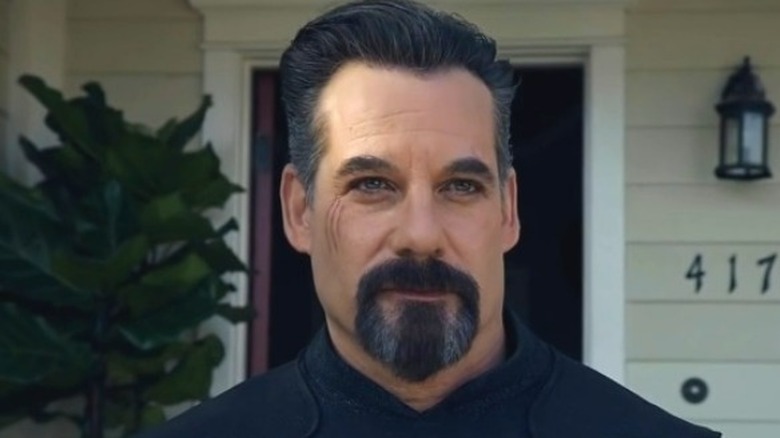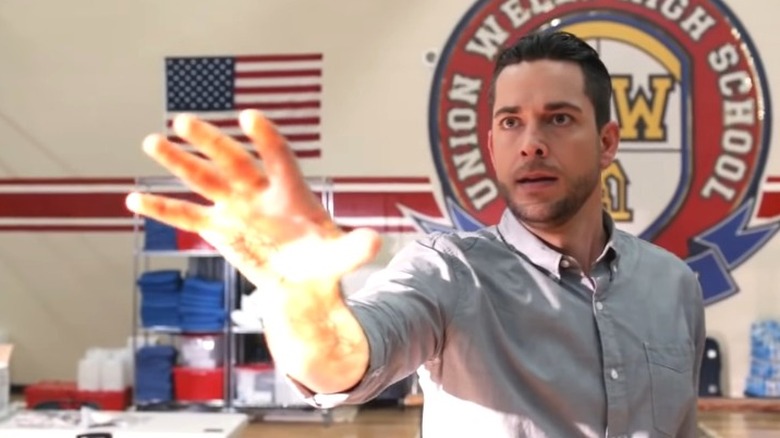The Untold Truth Of Heroes
In 2006, NBC launched "Heroes" to extraordinary ratings and critical acclaim, which led to the series quickly gaining a cult following around the world. This wasn't surprising, considering how unique the story was. Instead of filling each episode with action scenes in a monster of the week format, "Heroes" immersed viewers in the everyday life of individuals struggling to control their newly discovered superhuman abilities. The series also featured intriguing mysteries and converging character plots that gradually moved towards an exciting season finale.
The result was a cultural phenomenon. The world of "Heroes" was expanded in comics, webisodes, and even an alternative reality game. It turned its cast into stars overnight and changed the way networks saw serialized dramas. Sadly, the show's popularity diluted very quickly after fans gave up on Season 2, and the series was canceled just two years later.
Despite the attention "Heroes" attracted during its initial release and subsequent implosion, there are still many facts that fans of the show probably don't know, including famous actors that were almost cast in essential roles, a canceled spin-off that was going to be shot by famous directors, as well as its surprising connection with an '80s TV series. Here's a look at the untold truth of "Heroes."
Tim Kring's original intention was to start every season with a new cast
If there's something that truly stands out about "Heroes," it's the popularity of its ensemble cast. The series featured main characters from different countries and segments of society, from a recovering gambling addict in the U.S. to a young man working in a cubicle of a Japanese office building. The series also featured a politician, a nurse, and a cheerleader, among other characters, and each one developed a following. Fans eagerly waited to see how the story of their favorite character would evolve, whether it was the mind-reading policeman Matt Parkman or the mysterious serial killer known as Sylar.
Surprisingly, the initial plans the creator of "Heroes" had for the show would have made such a dedicated following impossible. In 2008, during a panel at the Screenwriter's Expo Tim Kring, the creator of the show, described how each season of "Heroes" was originally intended to tell the story of different groups of people coping with their newly found abilities (via CBR). To do that, "Heroes" would have featured an all-new cast of characters after each season finale.
However, as Kring explains, pretty much everyone, from the network to the viewership, became strongly attached to the characters from Season 1. Given that starting every season with a new cast could potentially destroy the show's enormous popularity, Kring opted to continue telling the story of Peter, Claire, Hiro, and Sylar for three more seasons.
Each writer was in charge of a specific character
There are many explanations for "Heroes'" initial success. The plot, for example, was quite ambitious for a TV series, and the marketing campaign, featuring cryptic character shots and symbols, only made audiences more curious about it. However, to survive a series has to do more than bring new viewers. It has to keep them tuning in each week. And the main reason behind this was the show's brilliant writing strategy.
In an interview with CBR, producer Bryan Fuller described the show as "Magnolia" meets "X-Men," noting that this unique blend of storytelling required a unique approach to writing the series. Fuller explained, "Each of us takes a character and writes those stories, and then we combine that, so every writer works on every episode."
By following this method, writers were able to direct their efforts toward making their characters' struggles and behavior feel realistic, and while they still had to find a way to weave each character's path into a single story, this task was tackled by the writers as a team. Bryan Fuller, for example, was in charge of Claire Bennet, the indestructible cheerleader on whom the world's fate depended. As a result of this approach, he was able to provide audiences with a believable teenager who not only had to cope with her new abilities but also the fact that the only person who posed a threat to her could use her to destroy the world.
The casting and portrayal of Sylar went through multiple changes
When it came to the casting of the superhuman serial killer Sylar, the showrunners took a very flexible approach, considering several different actors of varying ages and backgrounds for the role. One of them was none other than Christopher Eccleston, the man who played Doctor Who during the show's successful 2000s reboot (via Warped Factor). According to reports, scheduling issues may have prevented him from participating in the casting process for Sylar, but this didn't stop him from playing a character later in the season. Specifically, he would go on to play Claude Rains, a man with a deep resentment towards humanity, who still tries to help Peter understand his powers.
Interestingly, there was no hurry to cast Sylar, as the character wouldn't get a full face reveal until Episode 10 of Season 1, "Six Months Ago." In the first few episodes, he appears as a figure wearing a coat and a cap, with his face and body literally kept in the shadows. Zachary Quinto, in an interview with Buddy TV, stated that during these scenes the character was played by a stunt double. Reports by fans on Reddit suggest that one of the cast members who played him could have been stunt coordinator Ian Quinn, as indicated by a brightened screenshot from the episode "One Giant Leap."
Emma Stone auditioned to play Claire Bennet
It's hard to picture the character of Claire Bennet being played by anyone other than Hayden Panettiere. The iconic image of the actress in her cheerleader uniform became synonymous with the series during the early marketing campaign. In addition, her portrayal of a character who learns that being invulnerable to harm can become both a blessing and a curse captivated audiences. In fact, her performance was so good that during the casting process she managed to beat one of today's most successful Hollywood actresses for the role.
In a 2013 interview with The Independent, Emma Stone confessed that not only did she try for the part of Claire Bennet in "Heroes," but that losing the role proved to be a devastating blow for her. Stone remembers overhearing the team telling Panettiere that she got the role and feeling so bad she questioned whether she was ever going to have her big break. Ironically, that would come only two weeks later, when she was cast as Jules in the teenage comedy "Superbad," which would go on to become a financial and critical success. Stone would later solidify her career with appearances in movies like "Zombieland" and "The Amazing Spider-Man," and would even go on to win an Academy Award for her role in the film "La La Land."
Hiro is the only character happy about having superhuman abilities
One of the most prominent aspects of the premise of "Heroes" was how it treated the idea of gaining superhuman abilities. For most characters, their newly discovered powers were either useless or an obstacle when it came to the pursuit of their dreams and sometimes even a curse. Nathan Petrelli wanted to be seen as a competent man who voters could trust, and hated the idea of being seen flying around like Superman. Ted Sprague, on the other hand, had to live with the fact that his failure to control his ability to produce radiation led to the death of his wife.
Creating characters who saw their abilities as a burden was a persistent trend during creator Tim Kring's creative process. To his credit, most of the complaints characters had about their abilities felt organic. However, it was not realistic to assume every individual who suddenly acquired superpowers would see them as a bad thing. As reported in 2007 by Today, this was brought to Kring's attention by his wife, who suggested he included someone who was genuinely happy about their abilities.
Kring's response was Hiro Nakamura, an office worker from Japan who discovers with absolute joy the fact that, if he concentrates enough, he can stop and even reverse time. Unsurprisingly, Hiro brought balance to the show's somber tone and became one of its most popular characters.
The show's most famous quote may have been influenced by a forgotten '80s sci-fi series
The marketing campaign of "Heroes" was one of the most successful launched for a TV series in a long time. Marketing materials such as intriguing posters featuring the word "Heroes" above a cast of apparently normal characters and the looming image of an eclipse were enough to make millions of people tune in for the first season (via Variety). However, one of the most memorable aspects of the campaign is its famous tagline: "Save the cheerleader, save the world." This quote is frequently repeated in the show, and its real meaning is progressively revealed as the story moves forward.
Interestingly enough, a very similar sentence had been stated during the airing of a superhero-themed series from the '80s. "Misfits of Science" featured a cast of characters with powers like shrinking, telekinesis, and the ability to absorb and expel electricity who work together to fight crime. During its 16 episodes, the enigmatic phrase "Save Adele, save the world." can be heard repeatedly. As the B-Side Blog discusses, the similarity between the theme and quotes of both shows may seem like a coincidence, but this is harder to believe when we consider that Tim Kring, the creator of "Heroes," is credited as a writer for the show.
Heroes launched an ambitious transmedia campaign
While most of the credit for the success of "Heroes" should go to the writers, actors, and staff behind the scenes, NBC also invested considerable resources into keeping the show relevant. The network expanded the universe of "Heroes" through comics, novelizations, and a series of webisodes. For the second series of online episodes, NBC launched "Create Your Hero," a campaign that allowed fans to vote on the attributes of a new character. Nevertheless, the most engaging aspect of NBC's marketing campaign could be found within the series itself.
"The Heroes 360 Experience" was a complex alternative reality game that allowed fans of the series to unlock hidden content about their favorite show. Viewers could call numbers or visit websites featured in the show to register their email addresses or input codes, receiving in exchange messages from characters providing additional details about the world of "Heroes." The campaign started in the Season 1 episode "Godsend" and several websites were created for participants to interact with, including a campaign page for Nathan Petrelli, a blog dedicated to Chandra Suresh's research on genetics, and even the website for Primatech Paper, the fake company Noah Bennet pretended to work at.
The series was filled with references to geek culture
From the beginning, "Heroes" aimed at using serialized storytelling to engage mainstream audiences in the same vein as "Lost." However, it was undeniable that, at the time, a plot revolving around superhuman abilities was considered something that would attract mostly comic book readers. Fortunately, the story and performances proved so appealing that millions of people from different countries tuned in every week, regardless of their interests. More than a success, the show became a worldwide phenomenon, but this didn't mean writers forgot about their core audience.
The references to geek culture in "Heroes” go beyond the inclusion of characters who create and read comics. It also involves more subtle hints. "Kirby Plaza," for example, the location where the devastating explosion the heroes have to prevent takes place, is a reference to Jack Kirby, the artist behind the creation of characters like Black Panther, The Fantastic Four, and Darkseid. The series also features George Takei as Hiro's father, Kaito Nakamura. During one of his appearances, his car shows the plate number NCC-1701, the number of the starship Enterprise, which is a reference to Takei's role as Sulu in the original "Star Trek" series. The series even features Stan Lee as a bus driver in the Season 1 episode "Unexpected."
Heroes has an intriguing connection with the Cloverfield franchise
Before movies like "The Avengers" made the concept of a shared cinematic universe widely understood, many directors had already played with the idea. Kevin Smith's movies, specifically those featuring his characters Jay and Silent Bob like "Clerks" and "Dogma," officially exist in the same reality known as the View Askewniverse. In addition, many movies by Quentin Tarantino are connected by small details like the presence of Red Apple cigarettes. Based on this, fans such as Scoot Allan of Grizzly Bomb have suggested that "Heroes" could exist in the same reality as the film "Cloverfield," as they both feature the fictional drink Slusho.
It's not difficult to track the behind-the-scenes connection between "Heroes" and "Cloverfield." J.J. Abrams, who produced "Cloverfield," has often worked with Greg Grunberg, who plays Matt Parkman. Grunberg, like the drink, has appeared in many different J. J. Abrams productions, such as "Alias" and "Super 8," which means it could have been Grunberg who snuck a cup of Slusho in a shot from the Season 2 episode "Cautionary Tales." Executive producer Greg Beeman even posted some pictures of the characters posing with the mysterious drink on his blog, Beaming Beeman.
As a result, fans have argued that "Heroes" could exist in the same universe where "Cloverfield," "10 Cloverfield Lane," and "The Cloverfield Paradox" take place, as these three Abrams-produced films all feature Slusho in one way or another.
The series never recovered from the 2007 Writers Guild strike
As the years pass, it's normal for series to experience a slow decrease in ratings. Nevertheless, in the case of "Heroes," ratings dropped significantly during Season 2, which started a trend of continuously worsening viewership that didn't stop until "Heroes" was ultimately canceled. However, there's a reason why the quality of the writing began to decrease.
In 2007, as The Hollywood Reporter remembers, studios were starting to test different ways to offer movies and TV series through the internet. Most notably, people could download episodes of their favorite shows for a few dollars on platforms such as the Apple Store. The only problem was that production companies were not sharing these profits with the writers. This led to a 100-day-long strike that forced the production of numerous shows to stop, including Season 2 of "Heroes."
Showrunner Tim Kring told CBR that he had to come up with a solution rather quickly. Season 2 was originally planned to tell the story of the heroes dealing with the release of a devastating virus through 24 episodes divided into three volumes, two of which were to be titled "Generations" and "Exodus," while the third would potentially focus on the villains. Unfortunately, writers only had time to write 11 episodes, leaving various plot holes like new characters and future timelines that were never discussed again. This left a lot of fans disappointed, and the show started to lose viewers.
There was a scrapped spin-off that was going to be shot by famous directors
At the peak of the series' popularity, NBC planned to launch a spin-off anthology series titled "Heroes: Origins." The show was expected to feature original characters, giving fans the chance to choose which one would eventually join the main cast. Each episode was planned to be written and directed by people like Kevin Smith, an idea that was received with excitement and applause by fans during its announcement in the "Heroes" panel for the 2007 San Diego Comic-Con. However, 2007 didn't turn out to be a particularly great year for the series.
Season 2 started out with strong ratings for the show, reaching 16 million viewers for the season premiere, but these numbers quickly started to reduce and dropped below the 11 million mark. It's not surprising then that NBC started to think twice about investing more time and resources in a quickly declining brand. As expected, in November of the same year, Vulture reported that "Heroes: Origins" wouldn't go into production, and while the network tried to convince the press that this had nothing to do with ratings, this was the most likely explanation for the decision.
Adrian Pasdar would go on to play supervillains for both Marvel and DC
During his time on "Heroes," actor Adrian Pasdar did an excellent job portraying a formal individual who was highly reluctant to use his superhuman abilities. In fact, his performance was so good that it may have convinced some fans that the actor wasn't very fond of the genre. In the following years, though, Pasdar proved that he wasn't afraid of being typecast and went on to play several different comic book characters.
Pasdar returned to the superhero genre first in 2010 as the voice of Iron Man in multiple projects, such as the English dub of the "Marvel Anime" series and both the "Iron Man 3" and "Lego Marvel Super Heroes" video games. He would later be cast as General Glenn Talbot in "Agents of S.H.I.E.L.D.," a character that would later turn into Graviton, a supervillain with devastating gravitational powers (via Marvel). More recently, in 2017, Pasdar crossed from the MCU to the Arrowverse, playing the role of corrupt businessman Morgan Edge in "Supergirl."
Heroes Reborn was a mix between a sequel and a relaunch
The quality of the writing in "Heroes" started to decline considerably after Season 1. Despite this, many fans kept watching, hoping for the story to improve, something that never really happened. As a result, fans were skeptical when a new "Heroes" series was announced in 2015 (via Entertainment Weekly). It didn't help that fan-favorite characters like Peter Petrelli and Sylar wouldn't return. Claire Bennet's off-screen death was also hard to interpret as a good sign.
Despite this news, Tim Kring argued that "Heroes: Reborn" was supposed to be a continuation of the story, featuring some original characters and many references to "Heroes." At the same time, however, he described the series as a relaunch that would introduce new characters.
The result was a combination that disappointed fans of the original show and failed to secure a new audience. According to The Verge, while the original series took its time to introduce characters that were easy to identify with, "Heroes: Reborn" focused on a series of mysteries that were more confusing than intriguing. The story still followed the structure of individual plots that eventually merged, but it lacked the engaging performances and relatable stories that made Season 1 of "Heroes" so interesting. Consequently, the series received poor ratings and wasn't renewed for a second season, potentially ending the "Heroes" brand for good.
